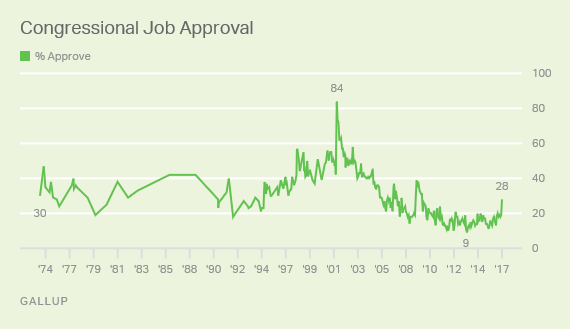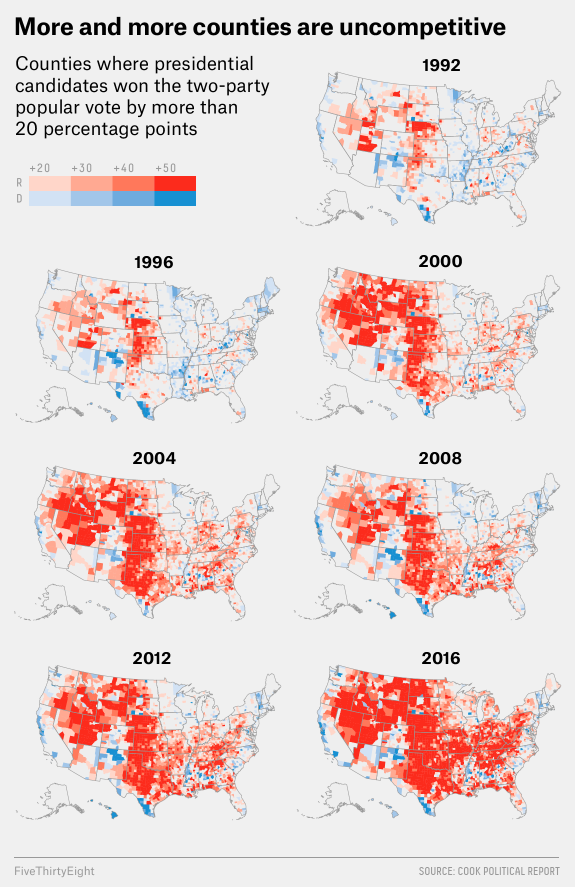Observation 2: We’re past the point where this blockage can be ignored or worked around. We’re also past the point where this blockage can be easily fixed.
First, a couple of assertions: As a nation and as a species, we are facing some grave problems. These problems will take political will to solve–market-based approaches are pipe dreams.
"Political will" is an abstract term, but at its heart it means "a coming together of the people." This is true everywhere. No matter how autocratic the government, nothing gets done without some acquiescence of the people. In the United States, this coming together is explicit in our system of governance. It’s significant that our Constitution begins with the words, "We the People."
Can we ignore the energetic blockage at the heart of our political system? To successfully ignore the blockage in our political system would require a system that is actually functioning. But think of the last thing that Congress did that (a) seemed like a serious attempt at a solution to a serious problem and (b) featured both parties working together to find that solution. The last bipartisan success I can recall was when Congress retroactively legalized the bulk spying on the American people that Edward Snowden revealed. But "let’s cover our asses" in the face of government law breaking is not a sign of a functioning system but the opposite.
Can we work around the blockage? On this front, my observation might be wrong: working around the blockage may be possible. With Republicans having control of both houses of Congress as well as the White House, the only thing that should be preventing them from steamrolling their opposition is the Democrats ability to filibuster in the Senate. It’s furthermore possible that the Republicans could end the filibuster completely to get their agenda passed. So we could see a conservative agenda make a strong advance between now and the midterm elections.
But consider the evidence to the contrary: We are almost one month into Trump’s administration, and what we are seeing so far is not unity between the Legislative and Executive branches of our government working to advance some kind of consistent agenda. What we are seeing right now is utter chaos.
From an energetic perspective, this chaos makes perfect sense. Blocked systems do not flow. Blocked systems succumb to illness. I admit, it’s early yet and there’s plenty of time for things to change. Perhaps the Republicans will find a way to stumble or surge along. But the dynamics of flow of energy suggest otherwise.
Can the blockage be easily fixed?
Let’s define "easily fixed" to mean that it will fix itself–that the government’s dysfunction, which has been growing since (at least) the Gingrich revolution in 1994, will start to ease and reverse.
To discuss the possibility, let’s talk about the single most contentious policy of the Obama administration, the Affordable Care Act a.k.a Obamacare.
The Republicans have opposed the ACA furiously since it was passed. They saw validation of their approach in the election of 2010, which certainly served as a stunning rebuke of the Democrats. (Democrats lost six seats in the Senate, an astonishing 63 in the House, and six governorships.) As it was the ACA which had dominated the shouting class in the run-up to the election, the view that the American people hated the ACA cannot be dismissed. But I want to propose that ire towards the law had very little to do with the quality of the law itself, but was instead a proxy for a deeper anger, namely, a sense that the people had been betrayed by Wall Street in causing the financial crisis, and that the focus on health care instead of a serious look at reform of the excesses of the financial industry felt like a further betrayal. In the midst of the worst financial crisis since the Great Depression, the Democrats were not given an electoral mandate to put their energy elsewhere.
Since then, the Republicans have engaged in endless theater around the ACA. You can remember the infinite number of times House Republicans voted to defund the ACA, a tedious piece of political theater which never had the slightest chance of succeeding while Obama remained in office.
But now Republicans control both houses of Congress and the White House (to the extent that anyone is currently in control of the White House). They have been promising to end "Obamacare" since it was passed and now they have the means to do so. And yet there’s been essentially no forward momentum to do so. Why is that?
It’s because the current situation is better than one in which the ACA is repealed without a replacement. The ACA is genuinely better than nothing at all, and the Republican have been forced to admit it via their actions (though obviously not their words). And so to make significant changes in the law without being totally harmful to the many millions who have benefited since the law went into place, and, let’s face it, harmful to the fortunes of Congresspeople who will have to answer to their constituents in a couple of years, puts Republicans in a tricky situation.
To deal effectively with what they’re trying to do would require them to challenge some of the beliefs that they have been shouting about for (at least) the past eight years. Maybe not all taxes are bad, and well-designed taxes levied for a specific purpose are worthwhile. Maybe a system that substantially increases access to health care, even if flawed, is better than a system that doesn’t allow that access. And maybe the initial problem was correctly diagnosed: that in a country as wealthy as ours, there is a something morally problematic with a system in which as substantial minority of people–many millions of them–lack access to even basic health care.
Given all of that, please consider this remarkable quote from Rep. Raúl Labrador, R-Idaho, from a couple of days ago:
Something that Republicans need to be concerned about is that [if] we’re just going to replace Obamacare with Obamacare-lite, [it] begs the question, were we just against Obamacare because it was proposed by Democrats? And if that’s our position, then we’re very hypocritical. Then we really were just taking a political position, not a policy-based position. If we’re going to come back with something that does exactly the same thing as Obamacare, but change a couple of things and just call it Trumpcare or Ryancare, then what was our fight about for the last six years?
To fully understand this quote, you have to know that Rep. Labrador is a member of the Freedom Caucus, a group of the most conservative lawmakers in house, closely aligned with the Tea Party. Labrador is not following the evidence to the obvious conclusion–that the Republican position on the ACA was never anything more than a political position. He’s doing the necessary mental contortions to continue to hold on to his opinion that Obamacare is a travesty. In other words, his identity as a conservative trumps any evidence that he and his party might be wrong about the ACA.
To be able to utter sentences like this and then hold on to the opposite conclusion is exactly what I mean when I say that the blockage we’re seeing cannot be fixed by any normal means.
In short, the only way forward to a working system will have to derive from a profound shift in consciousness.




